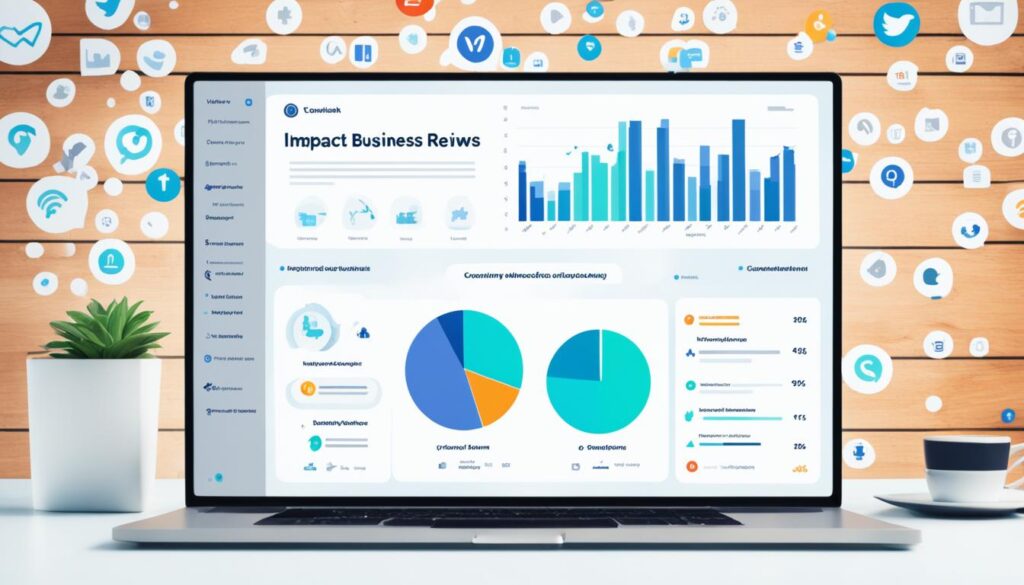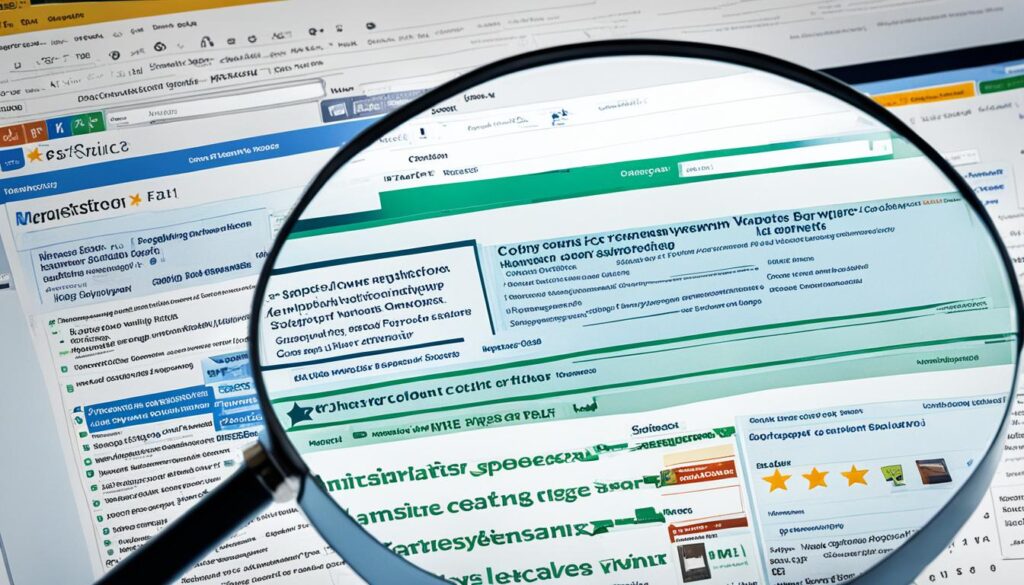In today’s digital age, what customers say about your brand is crucial. It affects how people see your company, especially in areas like retail, travel, cars, and health care. Online reviews are very important for companies with physical stores1. Almost 60% come from Google1. Plus, 87 percent of people trust online reviews when picking a local service or store2.
Over half of companies think they do poorly managing their online reputation1. This is bad since more than two-thirds of customers think companies should listen to feedback more1. Additionally, 88 percent have decided against a buy because of a bad review2. This shows the importance of having good ways to manage how your business looks online.
This guide looks at how reviews can really help a business. It talks about their impact, how to build trust, and the role of technology in managing this. A good Online Reputation Management (ORM) strategy can really boost your business. It can provide great chances and better service by using customer feedback smartly. It highlights how looking after your online reputation, by checking, responding, and promoting good reviews, can make a big difference. Especially in today’s digital-first world.
Key Takeaways
- Google hosts nearly 60% of all online reviews for physical businesses, making it a crucial platform for online reputation management1.
- More than half of businesses acknowledge their reputation management efforts are either basic or non-existent, missing out on significant opportunities1.
- 87 percent of Americans trust online reviews to guide their purchasing decisions2.
- 88 percent of consumers have avoided a company due to negative reviews, underlining the need for proactive reputation management2.
- A strategic ORM process can significantly boost business ratings, opportunities, and customer trust.
Understanding the Importance of Online Reputation Management
In our digital world, Online Reputation Management (ORM) is key for brands. It helps keep up a good image and builds trust with customers. ORM is all about how your brand looks on the web and in search engines. Now, companies must work hard to keep their online image positive.
What is Online Reputation Management?
ORM is about watching and shaping how people see your brand online. It involves tactics to get noticed more, handle feedback, and look trustworthy. This includes social media, reviews, and any place people share their experiences online.
Why Online Reputation Matters
Having a great online image matters a lot. Positive reviews win people’s trust, with 72% saying they do3. On the flip side, 94% avoid a business after a bad review3. By responding to reviews, businesses can look more trusty3. This shows how much reviews affect what people think.
The Impact of Online Reviews
Online reviews really shape how well a business does and what people buy. Almost everyone reads reviews before buying4. Nearly half ignore businesses with less than 4 stars5. Goods rated 4.2 to 4.7 tend to sell best4. Having reviews doubles a business’s chance of someone buying from it4. This is why reviews are so important.

Reaching 101 reviews can boost sales by 250% or more4. Almost half of shoppers won’t buy if there are no reviews4. This proves how critical reviews are in making buyer decisions. Businesses that handle reviews well have a big edge.
With these facts in mind, a strong ORM plan is vital. By staying on top of reviews and keeping a solid online profile, companies can boost their image and trust among consumers. They can also make the most of how impactful reviews are for growth and success.
How to Systematically Monitor and Respond to Reviews
Keeping an eye on what customers say is crucial. This step is key in managing online reputations well. We’ll look into why watching reviews closely, how to reply effectively, and how tech helps are all important.

The Role of Monitoring
Good review tracking is essential. It lets businesses learn from what customers say and find ways to improve. Did you know 77% of people think better of companies that listen and change based on their feedback? In the software industry, using feedback for product improvements is a must to meet customer wants6.
Strategies for Responding to Reviews Effectively
Replying to reviews, especially bad ones, is vital. A study found that 59% of folks see companies in a better light when they address complaints online. Setting up a smart way to collect and act on feedback can help resolve quality issues in review analysis. Using all available channels for feedback can make it easy for customers to share their thoughts7.
Utilizing Technology for Review Management
Technology can make handling reviews easier. AI tools, for example, can sift through tons of feedback data fast. This way, businesses can quickly learn what customers are saying and make necessary changes. Tools like Rapidr are great for managing a lot of feedback and linking it with CRM systems. They make it easier to track feedback from various platforms in one place. Plus, with real-time monitors, businesses can promptly address any negative feedback, solving issues before they grow6.
The Role of Technology in Review Management
Technology is key in managing online reputations. It ensures things are consistent and efficient. There are many tools for ORM, helping watch and get real-time alerts about the brand online. These digital tools are crucial for businesses to navigate the sea of feedback online.
Tools to Monitor Online Presence
ORM tools are essential for good online presence management. They help with many tasks like monitoring social media and scheduling posts. They also manage customer comments and boost the brand’s image online8.
Reputable management tools are also vital. They assist in tracking how people see the brand, replying to their feedback, and developing a strong brand image8.
Analytics tools are also key. They help keep track of brand activities. Plus, they help make smart decisions based on real data8.
Automating Responses for Efficiency
Setting up automatic responses, especially for bad feedback, cuts down on reply time. It also shows customers the brand is focused on their needs. Some studies show over half of people expect a reply to their review within a week9. Yet, many also say their reviews have gone unanswered9. So, using review automation can make customers happier.
Also, using digital asset management can streamline how brand materials are used and shared. It ensures brand materials are used in a consistent and easy manner8.
Using CRM systems is also vital. They help manage customer relationships and ensure the brand’s message is always consistent8.
Get More Reviews for Your Business
Boosting your business’s visibility and trust involves actively seeking customer reviews. We’ll look at key tactics to achieve this.
Asking Customers for Reviews
Simply ask your customers for feedback to start collecting reviews. Teaching your staff to request reviews can boost your feedback numbers, helping your online image10. Sending post-buy emails asking for thoughts sees an 8% reply rate11. Adding a call-to-action and QR code to your shipped items makes it simple for customers to review11. This approach tidies up the review-gathering process.
Providing Multiple Review Platforms
Varied review channels are important to meet all customer preferences. Set up a unique URL for faster customer reviews10. Making sure your business is verified on Maps and Search stands you out1012. Simplify the review process by having just one click necessary for your customers.
Incentivizing Reviews
Avoid offering rewards for reviews, as it’s usually not the best strategy10. Encourage feedback by focusing on positive customer experiences10. Thank and reply to reviewers to increase trust and loyalty10. Always keep your approach honest and open to safeguard your online rep12.
Strategies to Increase Review Volume and Quality
Getting lots of top-notch reviews is key for a business’s trustworthiness. This helps them deal with any bad feedback. By smartly collecting good reviews, a company can improve its online image and get noticed more.
The Significance of High-Quality Reviews
Seeing the value in great reviews is a must. Now, people trust online reviews just like they trust their friends’ advice13. Plus, almost everyone checks reviews before buying stuff, showing how much they sway decisions14. Good reviews not only make shoppers trust a brand more but also push its website higher in search results, improving its overall online standing13.
Timing and Method of Soliciting Reviews
When and how you ask for reviews really matters. Make it easy for customers to leave feedback, like with a direct link or email request13. And since responding to reviews can attract more customers, the faster you ask for feedback, the better15.
Ensuring Authenticity and Transparency
Keeping reviews real and clear is important for trust. Pure reviews help convince 96% of us about a business15. It’s vital to reply to reviews openly and show you’re always getting better14.
Overall, focusing on top-notch reviews, easy ways to get feedback, and being clear is crucial. With these in mind, companies can boost their online image and bring in more business, leading to steady growth.
Elevating Star Ratings and Search Engine Rankings
Knowing how star ratings and search rankings connect is vital for any business wanting to grow online. Managing reviews and responding strategically is a key part of Online Reputation Management (ORM). This is especially true for boosting local SEO star ratings.
The Relationship Between Ratings and Search Rankings
Research proves that more reviews can boost star ratings. This happens because asking for reviews shows a bigger view of your customer base16. Better ratings mean more trust from consumers. This trust can lead to more sales and increased search engine success.
Major search platforms like Google are where most people look for businesses17. When your business ranks high, more people will interact with your site. This connection between reviews and rankings is also seen in click-through rates, which can jump up to 30% with the right reviews18.
Moving up in Local Search Results
To rank better locally, gathering good reviews is crucial. It’s not just about getting reviews but handling them well. Positive reviews can directly boost your business’s online visibility. They help your business stand out on maps and in local searches18.
Sharing reviews on your site and keeping them up to date can also help with rankings17. Since nearly all consumers trust content made by other users, UGC is very valuable17. Regularly updating these reviews tells search engines your info is current, which can also boost your ranking18.
Showcasing Positive Reviews and High Ratings
Using good reviews helps brands look better and keeps customers interested.
The Power of User-Generated Content
People really trust online reviews, almost as much as friends’ recommendations13. Most folks, about 68%, peek at reviews before shopping from a local store. And, 78% say these reviews affect what they buy1920. Being part of these reviews can attract new customers and up sales by 144%20.
Incorporating Reviews into Marketing Materials
Working reviews into your marketing can really boost your brand. People read reviews to decide on a business; about 50% read at least five19. Putting these reviews on your site can build trust and up visitor spending by 162%20. Adding reviews to emails and ads spreads their good effect further, and improves your brand’s rockiness and search results20.
Using tech to show real-time positive reviews on your site keeps things fresh and boosts sales in your actual stores. More than half of shoppers felt reviews positively affected in-store sales20. This strategy boosts both your online and physical brand picture. Consistently responding to reviews helps create a loyal customer group, making for a successful future filled with honest feedback.
Conclusion
Today, having a strong online reputation is key for business success. A huge 93% of customers say online reviews affect what they buy. So, brands must work hard on Online Reputation Management (ORM) to succeed21.
To build trust among customers, businesses should focus on positive reviews. This can lead to a strong online image that wins over people. It’s not just about trust. Positive reviews also help with showing up better in searches and local results22.
When clients are happy, businesses should ask for reviews. Why? Because 80% of people are more likely to write a review if they’re asked21. Surprisingly, 30% of these happy customers have never been asked to share their thoughts23.
As tech grows, managing online feedback gets easier. New tools can help businesses keep track of reviews from different online sites. This makes it easier to get more feedback and reply quickly. Following the tips in this guide can help firms improve their online image. Then, they can use customer feedback to stand out and grow.

